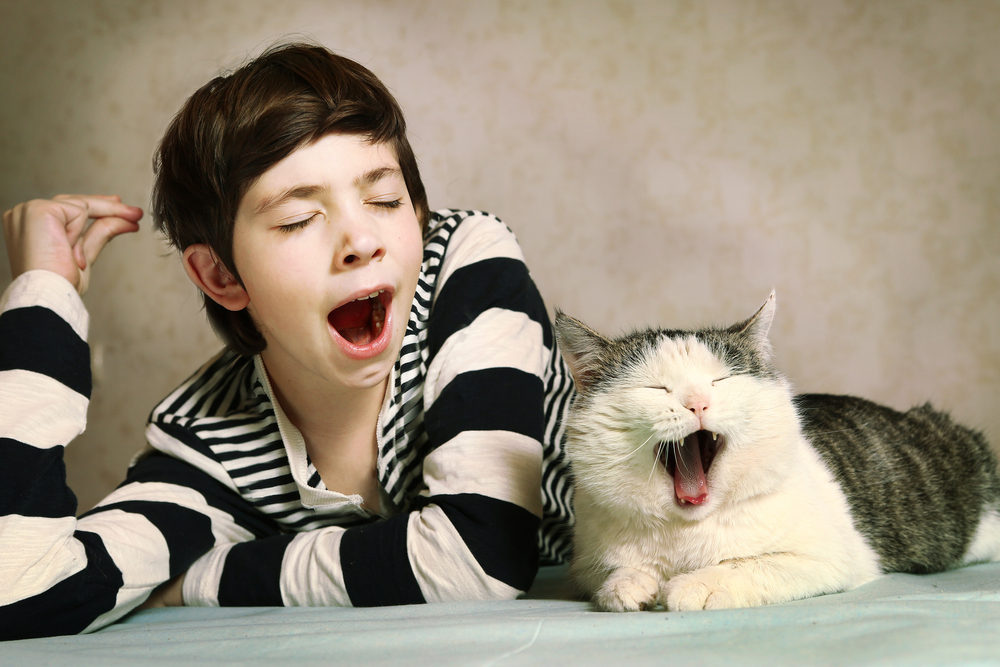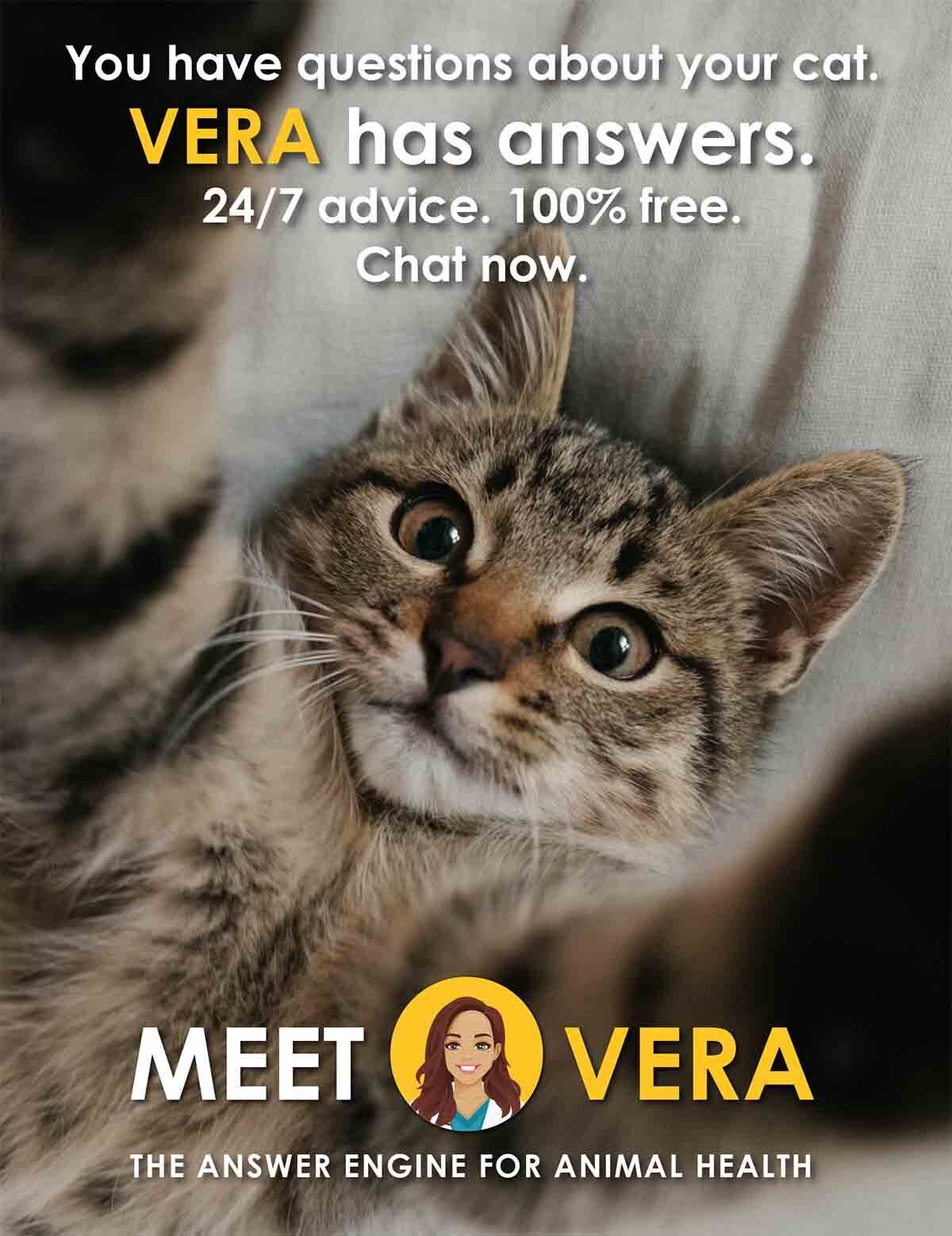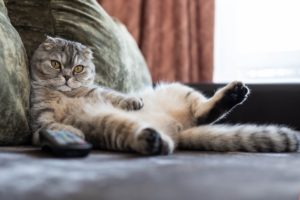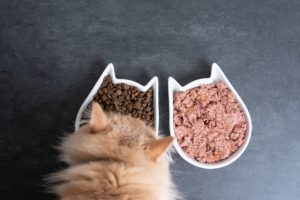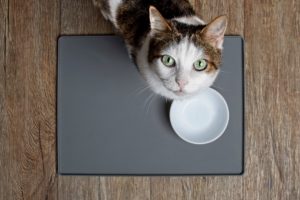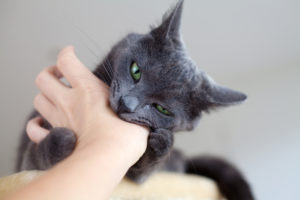Have you ever asked yourself the question, why does my cat’s breath stink? In between receiving head butts and providing chin scratches, you may have noticed your cat’s breath being more pungent than usual. Many cases of bad breath in cats are relatively easy to explain and can be due to common cat teeth problems and not much to worry about. However, there are some significant health problems, including dental disease in cats, that can be identified by investigating the cause of your cat’s halitosis.
First Things First
It may go without saying, but your cat’s breath will be more odor-ific if they just finished a tasty meal or caught a prey animal (such as a bird or a lizard). If this is the case, their breath should return to normal within a few hours! If your cat’s breath is still stinky, then chances are your cat is in need of attention.
Plaque and tartar buildup is THE most common cause of bad breath in cats—and one of the easiest to prevent at home. Your cat’s oral hygiene plays an important part in keeping your cat healthy.
Do you know how to clean your cat’s teeth? By brushing your cat’s teeth several times a week—or every day, if you can!—you can greatly reduce the amount of bacteria, plaque, and tartar in your cat’s mouth and give them the freshest breath possible.
If you can’t brush your kitty’s teeth, check out the pet store for dental care products that carry the Veterinary Oral Health Council (VOHC) seal of approval. These products have been certified in an independent laboratory to significantly reduce plaque and tartar build-up. You can find a list of approved products on their website.
If your veterinarian recommends a dental cleaning under anesthesia for your precious feline, this is a great opportunity to give your cat’s mouth a “clean slate” to maintain at home. It’s a win/win for you and your favorite cat!
Dental Problems
Unfortunately, a cat’s bad breath can sometimes indicate a more serious dental problem. If your cat has a broken tooth, for example, it can easily become infected and lead to a foul smell. Cats with heavy buildups of dental calculus—kind of like a bacteria-filled yellowish-brown cement on the surface of the teeth—can also have bad cat breath that won’t be resolved until a veterinarian removes the calculus under anesthesia. Fortunately, your cat’s wellness exams allow your vet to screen for these problems, even if your kitty isn’t having other symptoms at the moment.
In some cats, the immune system can overreact to even normal levels of bacteria and plaque on the surface of the teeth. The body treats this normal bacteria as a dangerous invader, and the result is severe inflammation of the gums and soft tissues of the mouth. This condition is called gingivostomatitis, and it is EXTREMELY painful for affected cats.However, many of these cats are still eating to survive, and the first symptom noted at home by their owners is often “bad breath.” Fortunately, this condition is easily diagnosed on a physical exam, and pain relief can be started right away if your cat is diagnosed with this rare but painful condition.
Illness Elsewhere in the Body
It’s not just dental disease that can cause bad breath! Sometimes bad breath is the first symptom of a more serious medical condition.
Ulcers in the mouth can cause severely smelly breath. An ulcer is when the top layer of the inside of the cheeks or the gums falls off and creates a painful sore in the mouth. Sometimes high fevers, like those caused by viral infections, can cause ulcers. Oral ulcers can also be caused by chewing on electrical cords or from lapping up harmful chemicals. Frequently, these issues also cause other symptoms—like drooling, pawing at the mouth, refusing to eat, and being more lethargic/hiding from household members.
In some cases, bad breath can actually be a symptom of diabetes. To be more precise, untreated diabetic cats can develop a condition called “ketoacidosis,” which makes their breath smell sweet to some people. Unfortunately, ketoacidosis can be life-threatening and require intensive care. Usually, cat owners will also notice other symptoms, such as vomiting, not eating, weight loss, urinating more frequently, and their kitty becoming tired and lethargic.
Another common medical issue that typically affects older cats is kidney failure. You’ve probably heard of this condition and know that affected cats will often be drinking more water and urinating more volume in the litter box. Cat kidneys are excellent filters, and when they aren’t working properly, toxins build up in the bloodstream. These toxins can cause damage to the fragile blood vessels in the gums and soft tissues of a cat’s mouth, leading to oral ulcers. The toxins in a cat’s bloodstream also build up so much that their breath smells like the toxins themselves—a condition called uremia.
The Bottom Line
While the most common cause of bad breath in cats is plaque and tartar build-up, there are sometimes more worrisome causes of your kitty’s mouth odor. If your cat is otherwise acting normally with a good appetite, maintaining their body weight, not drooling, and not having any changes in their urinary habits, this is the most likely cause of the stink. Some preventative maintenance may be all your cat needs! Make a non-emergency appointment with your veterinarian to discuss whether simple homecare or a dental cleaning under anesthesia is right for your kitty’s current dental health status.
However, if you are noticing any changes in your cat’s behavior, if they are losing weight, drooling, vomiting, or having changes to their litter box habits—then an urgent trip to the veterinarian is needed. A physical exam and some bloodwork can differentiate between the less-worrisome and more concerning causes of your cat’s bad breath.
If you’re not sure how concerned you should be, our AskVet Veterinarians are available to discuss all of your pet’s needs 24 hours a day, 7 days a week. Whether you have an immediate need or are looking to improve your pet’s overall wellbeing, just sign in to your pet app account and one of our friendly and knowledgeable veterinary experts will attend to your needs. No appointment required!
Written by:
Allison Ward, DVM
Dr. Allison Ward grew up in the suburbs of Washington, D.C. and started working in veterinary hospitals when she was 14 years old. After graduating from veterinary school in 2011, she completed a small animal rotating internship in New Jersey, followed by a neurology/neurosurgery internship in Miami. After completing this advanced training, Dr. Ward then moved on to general small animal practice. Dr. Ward’s professional interests include feline medicine, neurology, and pain management. Her passion for educating pet owners carries over into her work with AskVet, and she loves being able to help pets and their parents at all times of the day (and night!). She currently resides in sunny south Florida with her two cats, Larry and George.

